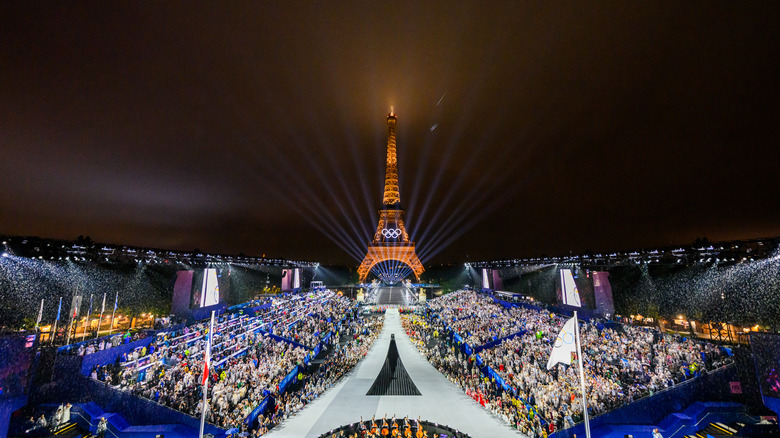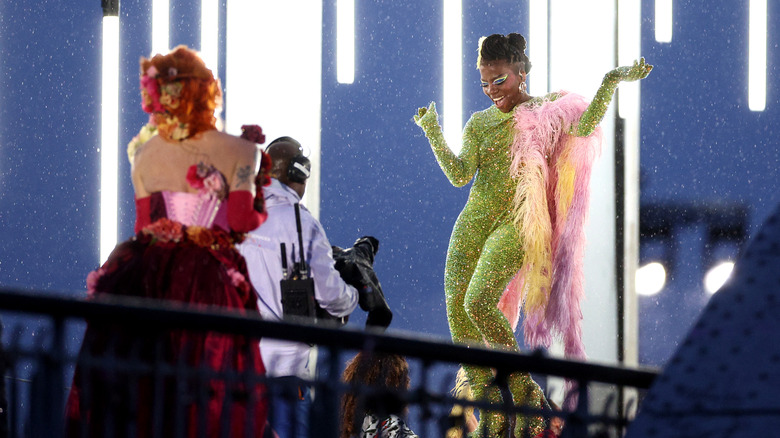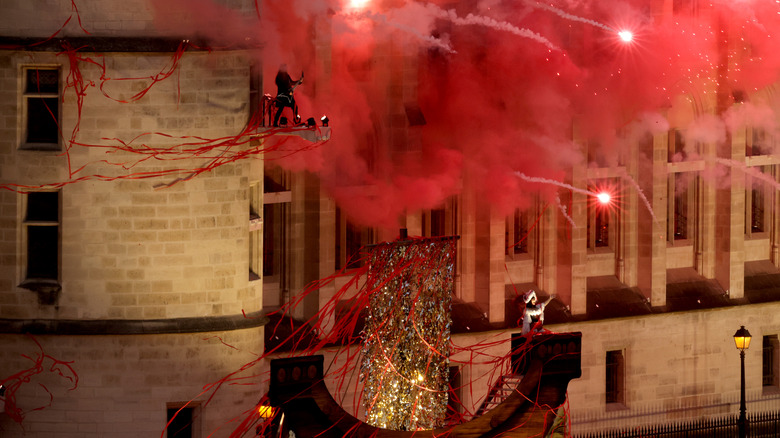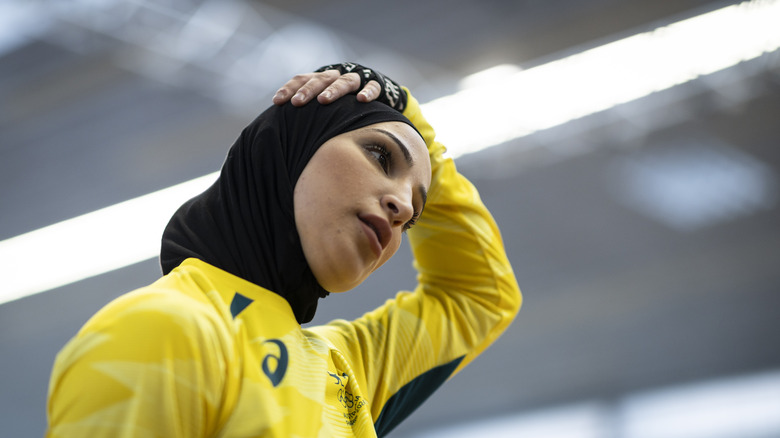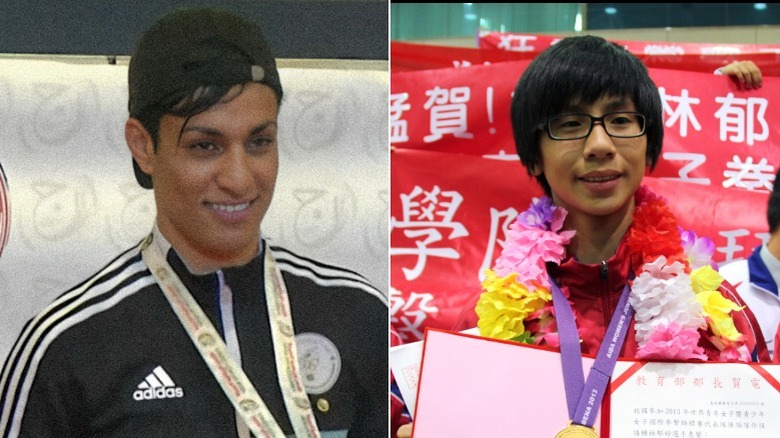The Most Controversial Things From The 2024 Olympics So Far
The 2024 Summer Olympics in Paris, France officially opened on Friday, July 26 and will run through Sunday, August 11. The country made quite a statement by choosing French heavy metal band Gojira for the opening ceremony. Accusations of Satanism followed, and not just for the acclaimed group. Snoop Doog, who was one of the torchbearers before the opening ceremony, also had to debunk rumors that his necklace was "satanic." And that's just the tip of the iceberg.
There's been plenty of controversy surrounding this year's Olympics, also known as Paris 2024. It's not surprising — the 2020 Summer Olympics in Tokyo had its fair share of scandals amid the COVID-19 pandemic, as did pretty much every other iteration of the event throughout the years. Of course there are also plenty of amazing highlights of athletic prowess, but that's not what we're covering today. Here are the biggest controversies of the 2024 Olympics so far.
A 'blasphemous' performance
The opening ceremony kicked off Paris 2024, and it included a show that ruffled more than a few feathers. During a tableau, dancers and drag queens performed a scene alongside a table, lined in a way that many likened to Leonardo da Vinci's "Last Supper" painting of Jesus Christ and the 12 apostles. They danced and sang around actor and singer Philippe Katerine, who was painted in glittering glue paint for the role of Dionysus, a Greek god of fertility, wine, and pleasure. Enraged viewers took to social media to call the event "blasphemous" and mocking of the Christian faith.
Thomas Jolly, the artistic director of the opening ceremony, pushed back against the criticism and said the performance was not meant to be subversive and instead intended to "talk about diversity" "We wanted to include everyone, as simple as that," he explained at an International Olympic Committee media briefing, per NBC News. "In France, we have freedom of creation, artistic freedom. ... We are republic, we have the right to love whom we want, we have the right not to be worshippers, we have a lot of rights in France, and this is what I wanted to convey." As reported by Deadline, Jolly told news channel BFMTV the scene was specifically meant to depict a "big pagan celebration, linked to the gods of Olympus, and thus the Olympics."
Paris 2024 spokesperson Anne Descamps eventually apologized and claimed there was no intention to offend. "Clearly there was never an intention to show disrespect to any religious group," she said at a press conference, per Yahoo News. "On the contrary, I think that (artistic director) Thomas Jolly really tried to celebrate community tolerance."
'Satanic' metal music
As we mentioned, metal band Gojira performed the 19th-century French anthem "Ah! Ça Ira" during the opening ceremony of Paris 2024. It was a massive spectacle that included lots of fire, a beheaded Marie Antoinette, and of course heavy riffs. Though many praised the production, Fox News pundits decried the performance, as did right-wing commentators like accused sex trafficker Andrew Tate. "Satanists control the west and they show you that they worship the devil," he wrote on X, formerly Twitter. "It's not a conspiracy theory. They literally show you. Are you blind?"
Gojira frontman Joe Duplantier laughed off the accusations, though, pointing to France's history of separating state from religion during the French Revolution of the late-1700s. "It's none of that," he told Rolling Stone. "It's French history. It's French charm, you know, beheaded people, red wine, and blood all over the place — it's romantic, it's normal. There's nothing satanic."
A hijab ban
If alleged blasphemy is one pattern in the 2024 Olympics controversy, outfits and attire is next. Notably, France has barred French athletes (but not those from other countries) from wearing the hijab or other religious headscarves at all levels of sport — amateur, youth, professional, and of course Olympic. Though there is no national legislation, individual sports federations enforce the ban. Amélie Oudéa-Castéra, the French sports minister, said in September 2023 that the ruling is tied to the country's secularist political ideology that prohibits religious displays in sports.
Athletes both within and outside of France have opposed the decision. "Women have the right to choose how they want to dress," Australian boxer Tina Rahimi (above) wrote on Instagram. "With or without hijab. I choose to wear the hijab as a part of my religion and I am proud to do so." Still, the International Olympic Committee (IOC) has supported France's decision, noting that "freedom of religion is interpreted in many different ways by different states," per The Telegraph. Groups like Amnesty International have condemned the IOC and asked it to overturn its decision.
A revealing uniform (or constume)
Before Paris 2024 got underway, an outfit in Nike's official kits for women's track and field competitors at Paris 2024 was slammed as too revealing. An image of the one-piece leotard with a high-cut bikini line circulated on social media in April 2024 alongside the male alternative and stirred plenty of debate. "Uniform or costume?" the CBC asked. On Instagram, U.S. track and field athlete Lauren Freshmen seemed to be in the former camp, calling it a "costume born of patriarchal forces." Elsewhere on Instagram, Olympic champion pole vaulter Katie Moon, a Nike athlete, called the outfit "concerning" and said it "warranted the response it received." However, she noted that it would not be the only option — and took aim at some of the critics. "If you honestly think that on the most important days of our careers we're choosing what we wear to appease the men watching over what we're most comfortable and confident in, to execute to the best of our abilities, that's pretty offensive," she wrote.
Jaime Schultz, a kinesiology professor and author of "Regulating Bodies: Elite Sport Policies and Their Unintended Consequences," suggested that such designs are sexualized to draw viewers and generate more money. "Once we accepted that women are going to be [Olympic] athletes, [sports federations and brands] wanted to try to make some money off of that, which is where the sexualization aspect comes in," he told Women's Health.
Failed gender tests
Imane Khelif of Algeria and Lin Yu‑ting of Taiwan both failed gender eligibility tests for the 2023 Women's World Boxing Championships, but were cleared to fight in Paris 2024. Lin is a two-time worlds gold medalist — she won the bantamweight class in New Delhi in 2018 and the featherweight competition in Istanbul in 2022. Meanwhile, Khelif won a silver in the light welterweight division. The controversy over Paris 2024 appears to be surrounded in confusion and conflicting statements.
Umar Kremlev, the president of the International Boxing Association (IBA), told Russia's Tass agency at the time of the 2023 bans that DNA tests of the athletes revealed XY chromosomes, typically possessed by men. Outlets like Marca called them "male-born transgender boxers," while NBC News suggested this is not known. "Khelif and Lin have both always competed as women, and there's no indication that either identifies as transgender or intersex, the latter referring to those born with sex characteristics that don't fit strictly into the male-female gender binary," the outlet wrote. After Khelif won her opening bout, Diario AS reported she was "born as a female" but with a disorder of sex development (DSD) — a possible cause of her reported XY chromosomes and increased testosterone levels. Elsewhere, LBCI Lebanon sports anchor and reporter Rayane Moussallem claimed on X (formerly Twitter) that Khelif does not have XY chromosomes despite initial reporting.
AP News characterized the clash between the IOC and IBA as "fallout" from a "years-long dispute" over leadership failures, finances, and integrity. In June 2023, the IOC withdrew its recognition of the IBA due to a "total lack of financial transparency," effectively barring the governing body from the Olympics.
[Featured image by ALGÉRIE PRESSE SERVICE via Wikimedia Commons | Cropped and scaled | CC BY-SA 3.0]
[Featured image by 蔡厚瑄 via Wikimedia Commons | Cropped and scaled | CC BY-SA 3.0]
